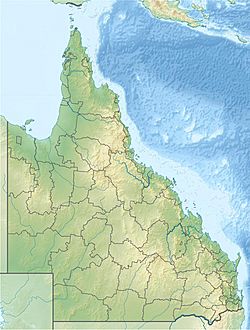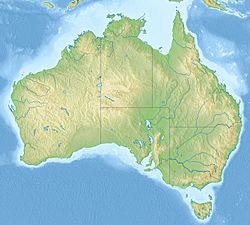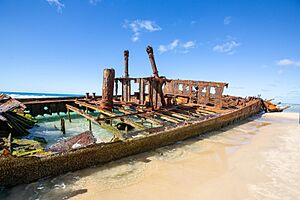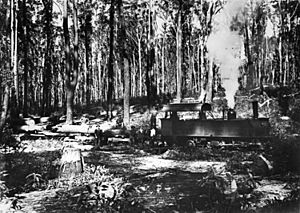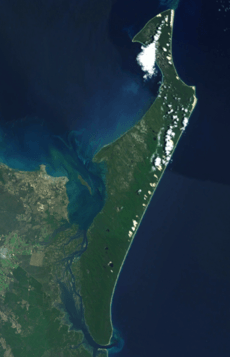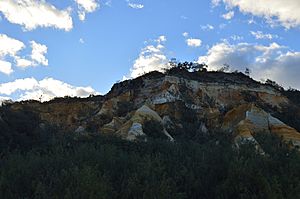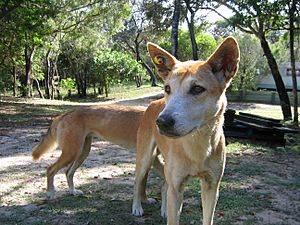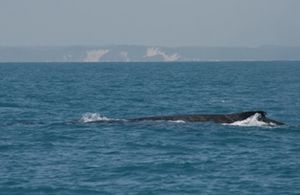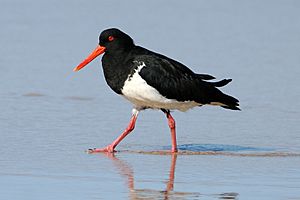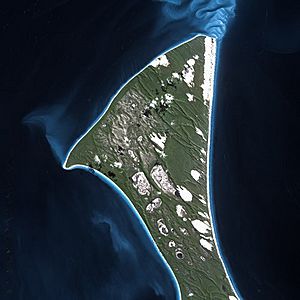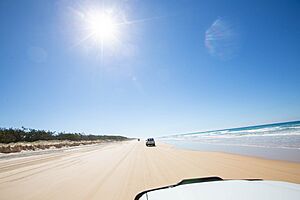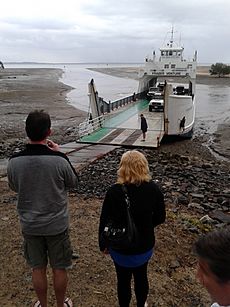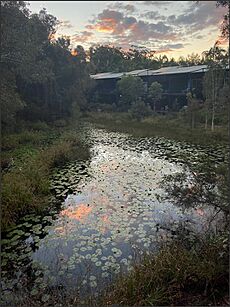K'gari facts for kids
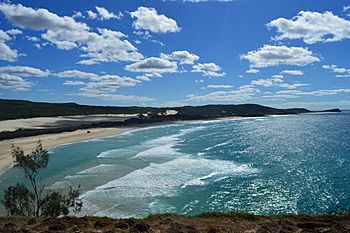
The beach from Indian Head, May 2016
|
|
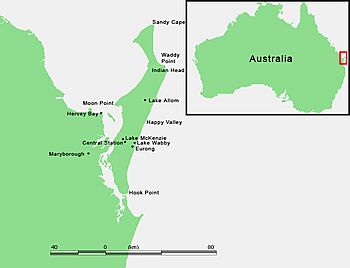
Map of K'gari, including its location in Australia
|
|
| Etymology | Paradise in Butchulla |
|---|---|
| Geography | |
| Location | Fraser Coast, Queensland |
| Coordinates | 25°14′S 153°09′E / 25.24°S 153.15°E |
| Adjacent bodies of water | Great Sandy Strait, Coral Sea |
| Area | 1,655 km2 (639 sq mi) |
| Length | 123 km (76.4 mi) |
| Width | 22 km (13.7 mi) |
| Administration | |
| State | Queensland |
| Region | Wide Bay–Burnett |
| Local Government Area | Fraser Coast |
| Largest settlements | K'gari, Eurong |
| Demographics | |
| Population | 152 (2021 census) |
| Languages | Australian English, Butchulla |
| Additional information | |
| Time zone | |
| UNESCO World Heritage Site | |
| Criteria | Natural: (vii), (viii), (ix) |
| Inscription | 1992 (16th Session) |
K'gari (pronounced GAH-ree), meaning "Paradise" in the Butchulla language, is a special World Heritage Site sand island in Queensland, Australia. It's about 250 kilometers north of Brisbane. K'gari is part of the Great Sandy National Park, protecting its unique environment. While 152 people lived here in 2021, up to 500,000 visitors come yearly! K'gari is the traditional home of the Butchulla people. Formerly Fraser Island, it was officially renamed K'gari on June 7, 2023, honoring its original name.
Contents
- A Journey Through Time: K'gari's History
- Who Lives on K'gari?
- What's in a Name? The Story of K'gari
- K'gari's Past Industries
- Exploring K'gari's Amazing Geography and Nature
- Amazing Animals of K'gari
- K'gari's Wonderful Plant Life
- Protecting K'gari: How the Island is Managed
- Special Places: K'gari's Heritage Listings
- Visiting K'gari: A Paradise for Tourists
- Images for kids
A Journey Through Time: K'gari's History
The Butchulla People: K'gari's First Caretakers
The Butchulla people have lived on K'gari for thousands of years. Their creation story tells how a sky spirit, Yendingie, and Princess K'gari created the island. Princess K'gari loved the place and was transformed into the island. The Butchulla language is vital to their culture. European settlers brought many changes to their traditional way of life. Ancient sites on the island show their long history.
European Contact and the Eliza Fraser Shipwreck
James Cook first sighted K'gari in 1770. Matthew Flinders explored the coast in 1799 and 1802. In 1836, Captain James Fraser and his wife, Eliza Fraser, were shipwrecked. Their ship, the Stirling Castle, hit coral. Captain Fraser died, but Eliza survived with the help of the local Butchulla people. The island was named Fraser Island after her husband for many years.
The Maheno Shipwreck: A Coastal Landmark
The shipwreck of the SS Maheno is a famous K'gari landmark. Built in 1905, it was a luxury passenger ship and a hospital ship in World War I. In 1935, a powerful cyclone caused it to wash ashore on K'gari. During World War II, it was used for target practice. Today, the rusty wreck is a historical site; climbing on it is not allowed.
K'gari's Role in World War II
During World War II, K'gari hosted the Fraser Commando School. Thousands of special forces soldiers trained here. The island's conditions were similar to those on Pacific Islands where battles were fought.
Becoming a World Heritage Site
In 1992, K'gari was recognized as a UNESCO World Heritage Site. This means it's globally important to protect. In 2021, its traditional name, K'gari, was added. On June 7, 2023, the island was officially renamed K'gari.
Recognizing Butchulla Rights
In October 2014, the Federal Court of Australia recognized the Butchulla people's native title rights over K'gari. This gives them special rights to hunt, fish, and use water. It also creates new opportunities for them, like ecotourism.
The 2020 Bushfire
In October 2020, a large bushfire started on K'gari from an illegal campfire. It spread widely, threatening communities. Firefighters, including water-bombing aircraft, worked hard to control it. Heavy rainfall in December helped. It burned for over two months, affecting more than half the island. K'gari reopened to visitors in December, and burned areas are recovering.
Who Lives on K'gari?
In 2021, the island had a small population of 152 people.
What's in a Name? The Story of K'gari
The island's original name, K'gari, means "Paradise" in the Butchulla language. It comes from a creation story about a spirit named Princess K'gari. After European settlement, it was called Fraser Island, after Captain James Fraser. In 2011, K'gari was added as an alternative name. On June 7, 2023, the Queensland Government officially renamed the entire island to K'gari, honoring its cultural history.
K'gari's Past Industries
Logging: Harvesting Timber from the Sand
Logging began on K'gari in 1863. Valuable trees like satinay were harvested; some logs even helped build the Suez Canal. Logging stopped in 1991 due to environmental concerns, protecting the island's unique forests.
Sand Mining: A Fight for Conservation
K'gari's sand contains valuable minerals. Sand mining occurred from 1950 to 1977. Environmental groups fought to stop it, worried about the island's nature. The Australian government eventually halted mining, a big win for conservation.
Exploring K'gari's Amazing Geography and Nature
K'gari: The World's Largest Sand Island
K'gari is the world's largest sand island, about 123 kilometers long. It's made of sand accumulated over 750,000 years. Uniquely, tall rainforests grow here, supported by fungi in the sand. The island is part of the Great Sandy National Park.
Freshwater Creeks and Unique Swamps
{{gallery Image1=Eli creek Fraser Island.jpg|Eli Creek is the largest creek on the eastern beach. Image2=Australia, Queensland, Fraser Island, Eli Creek, mouth.jpg|Eli Creek where it enters the sea }} K'gari has many freshwater creeks. Eli Creek on the east coast flows with 80 million liters daily. The island also features rare swamps called fens, discovered in Australia in 1996.
The Moving Sands and Colorful Cliffs
K'gari holds 113 cubic kilometers of sand, carried from mainland rivers. Dunes shift 1 to 2 meters yearly, reaching 244 meters high. Colored sands at places like The Pinnacles get their hues from minerals. The "75-Mile Beach" on the east coast is a main road and plane landing strip.
K'gari's Pristine Freshwater Lakes
{{gallery Image1=LakeMcKenzieNov112024.jpg|Lake McKenzie, 2024 Image2=Hammerstone Sandblow and Lake Wabby.jpg|Hammerstone Sandblow and Lake Wabby }} K'gari has over 100 clean freshwater lakes, many of them "perched lakes" on sand. Lake McKenzie is famous for its pure silica sand and clear water. Lake Boomanjin is the world's largest perched lake on a sea island. Motorboats are banned to protect these special lakes.
K'gari's Weather and Climate
K'gari has a warm, tropical climate, moderated by the ocean. Temperatures are usually between 7°C and 33°C. Rainfall is heaviest in summer. Cyclones can cause beach erosion. Sea temperatures are warm year-round.
| Climate data for Fraser Island (Sandy Cape Lighthouse), 1991 - 2020 | |||||||||||||
|---|---|---|---|---|---|---|---|---|---|---|---|---|---|
| Month | Jan | Feb | Mar | Apr | May | Jun | Jul | Aug | Sep | Oct | Nov | Dec | Year |
| Record high °C (°F) | 34.2 (93.6) |
35.8 (96.4) |
34.7 (94.5) |
31.4 (88.5) |
28.7 (83.7) |
27.8 (82.0) |
26.5 (79.7) |
27.2 (81.0) |
29.3 (84.7) |
31.8 (89.2) |
33.2 (91.8) |
36.0 (96.8) |
36.0 (96.8) |
| Mean daily maximum °C (°F) | 29.8 (85.6) |
29.8 (85.6) |
28.9 (84.0) |
27.1 (80.8) |
24.4 (75.9) |
22.4 (72.3) |
21.8 (71.2) |
22.8 (73.0) |
24.9 (76.8) |
26.3 (79.3) |
27.8 (82.0) |
29.1 (84.4) |
26.3 (79.3) |
| Daily mean °C (°F) | 26.2 (79.2) |
26.3 (79.3) |
25.4 (77.7) |
23.7 (74.7) |
21.1 (70.0) |
19.1 (66.4) |
18.2 (64.8) |
19.1 (66.4) |
21.2 (70.2) |
22.6 (72.7) |
24.2 (75.6) |
25.5 (77.9) |
22.7 (72.9) |
| Mean daily minimum °C (°F) | 22.7 (72.9) |
22.8 (73.0) |
22.0 (71.6) |
20.3 (68.5) |
17.9 (64.2) |
15.8 (60.4) |
14.7 (58.5) |
15.5 (59.9) |
17.5 (63.5) |
19.0 (66.2) |
20.6 (69.1) |
21.9 (71.4) |
19.2 (66.6) |
| Record low °C (°F) | 16.7 (62.1) |
16.1 (61.0) |
14.6 (58.3) |
13.3 (55.9) |
9.6 (49.3) |
6.7 (44.1) |
5.2 (41.4) |
5.6 (42.1) |
9.4 (48.9) |
11.2 (52.2) |
13.9 (57.0) |
16.0 (60.8) |
5.2 (41.4) |
| Average rainfall mm (inches) | 150.3 (5.92) |
157.6 (6.20) |
141.8 (5.58) |
111.0 (4.37) |
127.9 (5.04) |
101.5 (4.00) |
70.1 (2.76) |
53.8 (2.12) |
42.4 (1.67) |
90.7 (3.57) |
62.2 (2.45) |
99.8 (3.93) |
1,209.1 (47.61) |
| Average rainy days (≥ 1.0 mm) | 9.9 | 10.0 | 11.4 | 11.2 | 11.0 | 9.8 | 8.2 | 6.1 | 4.7 | 5.5 | 5.5 | 7.4 | 100.7 |
| Source: Bureau of Meteorology | |||||||||||||
Amazing Animals of K'gari
Mammals and Wild Dingoes
K'gari is home to many mammals, including swamp wallabies, echidnas, possums, gliders, bandicoots, and flying foxes. Nineteen bat species also visit. K'gari is known for its wild dingoes, considered some of Australia's purest. Pet dogs are banned to protect them. Dingoes are wild animals; never feed them and always keep a safe distance. Rangers manage the dingo population for safety. Dingo-proof fences protect some settlements. In 2015, about 180 to 220 dingoes lived on K'gari.
Reptiles, Amphibians, and Marine Life
K'gari has 74 reptile species, including goannas, geckos, skinks, and many snakes (some venomous). Unique frogs live in acidic lake waters. Freshwater turtles swim in lakes. Occasionally, saltwater crocodiles visit in warmer months but do not breed here. The surrounding waters host humpback whales, dolphins, dugongs, and sea turtles. Various sharks are present, so caution is advised. On land, K'gari has 300 ant species.
Birds: A Haven for Feathered Friends
Over 350 bird species live on K'gari. You can see birds of prey like sea eagles and ospreys. Other birds include pelicans, kingfishers, and kookaburras. Migratory birds from Siberia also visit. The rare eastern ground parrot finds a home here.
K'gari's Wonderful Plant Life
Diverse Plants and Unique Ecosystems
K'gari has over 865 plant species. It's unique for having tall rainforests growing in sand. Ancient satinay trees and kauri pines thrive here. Coastal areas feature salt-tolerant plants like pigface. The rare Angiopteris evecta fern, with the world's largest fronds, also grows on the island. Mangroves dominate the southwest coast.
Protecting K'gari: How the Island is Managed
Almost all of K'gari is part of the Great Sandy National Park, managed by the Queensland Environmental Protection Agency. Pet dogs are not allowed to safeguard the dingo population. Camping areas are sometimes closed to ensure safety for both people and dingoes.
Special Places: K'gari's Heritage Listings
K'gari has several heritage-listed sites. These include the Sandy Cape Light and the wreck of the SS Marloo. The island was added to the Australian National Heritage List in 2007.
Visiting K'gari: A Paradise for Tourists
K'gari is a very popular tourist destination, attracting hundreds of thousands of visitors yearly. People come for its beauty and to see wild dingoes. Using boardwalks helps protect the environment. "Central Station," a former logging hub, is now a popular visitor spot.
Access, Fishing, Camping, and Hiking Adventures
Ferries from Hervey Bay or Rainbow Beach take you to K'gari. A four-wheel drive vehicle is needed for most island travel, as roads are sandy. Permits are required for vehicles and camping. Fishing is popular, but banned in freshwater. K'gari offers many campgrounds and hiking trails, including the 90-kilometer K'gari (Fraser Island) Great Walk.
Images for kids
 | James B. Knighten |
 | Azellia White |
 | Willa Brown |


